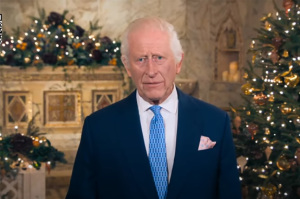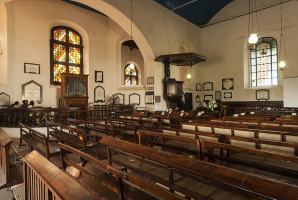Gangsta Rap Has No Home in Black Churches, Leaders Say
The president of a consortium of denominational seminaries urged black congregations this week to condemn “gangsta rap” in their churches.
The Rev. Michael A. Battle, president of the Interdenominational Theological Center in Atlanta, spoke this Thursday at the third annual Pastors and Laity Conference held at West Angeles Church of God in Christ in Los Angeles. The African American pastor talked about how gangsta rap degrades black youth today, especially woman, and how this new popular genre has taken away all of the positive aspects that come from rap, which is to express the negative sociological situations that many blacks live in currently.
"The church ought to say, 'If you can't do more positive rap, shut up and get the [expletive] out,'” expressed Battle, according to the Los Angeles Times.
Gangsta rap denigrates all young blacks, especially black women, the Baptist preacher said. He noted that the style of rap music has stolen "the soul of positive rap," meant to articulate the "sociological circumstances" of African Americans, especially men.
Battle’s position on gangsta rap comes at a time where many people are questioning the culture of today’s African Americans. They argue that nobody is taking a stand against the negative influences that surround black culture.
Over the past year, there have been an increasing amount of occurrences where black culture has been criticized for its harmful content.
In one example last November, Michael Richards, notable comedian from the sitcom Seinfeld, had gone on a tirade of racial remarks at the Laugh Factory, a popular comedy club in Los Angeles. Among the ensuing controversy that outraged the black population, a few African American figures came out blaming black culture rather than Richards.
They argued that African Americans were keeping hate-filled words, such as the n-word, in circulation, through a double standard. Had blacks not continued to throw around this derogatory word, it would have eventually died out.
Citing incidences like these, African American ministry leaders are trying to encourage black culture in a positive way, urging the community to begin expressing their traditions in a more constructive manner.
One group that has answered the call is Dem Unknown WarriorZ, a sextet of African American Christian singers that has taken the recently popular crunk sound to preach the gospel.
"We're fishing," said group leader Bennie "Preacha" Foster to Associated Press. "The bait youngsters are eating is hip hop. So we take that music, dice it up, we put some Jesus flavor to it and save souls in Jesus' name. That's how we do it."
Still, there is still criticism saying that Christians should not use worldly tactics to save souls. Critics feel that the youth are only interested in the beat, not the message behind it. They still associate the rhythm with what they have heard before on the radio.
Most ministries do, however, agree that there is a need for new methods in which to reach individuals. But the extent to how far Christian culture can reach into popular culture is still debated.
Whatever the stance, Battle noted the need for Christians to speak up against trends in the black community that are clearly destructive in nature.
"Tell the truth, even if you don't get a federal grant," Battle said. "Tell the truth, even if you don't get appreciated by those in power."
The Rev. Mark V. C. Taylor, pastor of the Church of the Open Door in Brooklyn, N.Y., also spoke at the conference in Los Angeles noting how “rappers say, 'The streets say this.'"
"One reason the streets can say things is because there is not enough Christians in the street … to challenge," he said, according to the Los Angeles Times.
The Rev. Amos Brown, pastor of Third Baptist Church in San Francisco, supported this by explaining that black churches need to clarify values for their current youth. There needs to be involvement across the whole nation to make this effective, the Times reported him as saying.
The Rev. Frank Portee III, pastor of the Church of the Redeemer in Los Angeles and conference dean, summarized the argument: "When pastors get together and talk about their common issues, problems and challenges, through that interchange, the Holy Spirit is able to empower us above the negativity and move into the direction of empowerment and change.”
The conference also dealt with other African American issues including demographic changes, educating black clergy, and the rise of Islam among blacks.





























